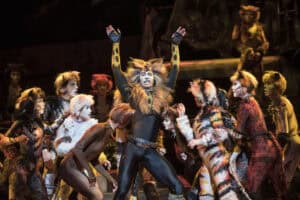In Blood Brothers, currently running at Pieter Toerien's Montecasino Theatre in Fourways, Bianca le Grange plays Mrs Johnston, the mother of seven children, including twins who are separated because she can't afford to keep both of them.

Sadly, it’s not a rare situation, but it is one that Le Grange has been blessed to avoid. How does she make her way into such a dark headspace?
“I’m not an actress,” claims Le Grange.
“I never had the opportunity to finish my studies at what was Pretoria Technikon at the time. I was studying musical theatre and I wanted to go in that direction. But that was a while ago and when [Blood Brothers director] David Kramer called me last year to audition, I actually didn’t know how to react. I thought, ‘I’ve been around in the industry so long now and people know what I can do, so why must I audition?’ But I did not know what a big acting role this was. I’d say it’s more drama with music than an actual musical. The story is so intense.
“How I get into that role is interesting. For literally a week during rehearsals, David sat with us and all we did was research. We researched the characters and the era – David had adapted the story from the original, which happens in Liverpool – and set it in 1965 in District Six. But this story is not about District Six. It’s about a mother and the struggles she goes through; and these two boys that get separated and then find each other again. I had to get to know all of these different stories.”
Le Grange added to the existing source material to better connect with her character. “In the original, my character is just called Mrs Johnston,” she says, “but I named her Evelyn so I could form an attachment with her.
“‘Evelyn was my mother’s mom, my granny, who passed on a couple of years ago and Mrs Johnston reminds me a lot of her; of her character. The story is really like Doreen le Grange’s – my dad’s mom, who had seven kids and struggled through life. It was so interesting that I could tap into my personal experiences.”
Experience of the phenomenon explored in Blood Brothers certainly helps to make Le Grange’s performance convincing.
“In the community I come from, people have a lot of kids. People have kids at a young age, especially in my mom’s and granny’s time,” she says.
“These are the stories we grew up listening to: ‘We were 12 kids growing up’ and so on. You had so many aunties and uncles that you didn’t actually meet them all. I’m so grateful to have siblings myself. I think being alone is a bit garra.”
That sort of slang is used by Kramer in his adapted Blood Brothers script and does it in such a way that it’s always easy to understand.
“An American friend of mine came to see the show the other night,” says Le Grange, “and he enjoyed it so much. I was worried about the slang; those are the bits where a lot of the jokes are.”
The score for Blood Brothers is made up of very singable, melodic songs – the antidote to the sometimes overly wordy fair delivered by Stephen Sondheim or Andrew Lloyd Webber. Where does this sort of material sit in terms of Le Grange’s personal taste?
“I’ve always been a musicals fanatic,” she smiles. “It’s that old Bollywood thing where they talk a bit and then they sing for a bit – I’m a bit quirky like that. The music sets a mood and a tone and touches people in a different way than just speaking does.”
Support Local Journalism
Add The Citizen as a Preferred Source on Google and follow us on Google News to see more of our trusted reporting in Google News and Top Stories.







